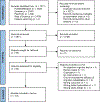Impact of Cognitive Rehabilitation on Cognitive and Functional Outcomes in Adult Cancer Survivors: A Systematic Review
- PMID: 39048409
- PMCID: PMC11402594
- DOI: 10.1016/j.soncn.2024.151696
Impact of Cognitive Rehabilitation on Cognitive and Functional Outcomes in Adult Cancer Survivors: A Systematic Review
Abstract
Objectives: This systematic review (PROSPERO CRD42021275421) synthesized evidence on the efficacy of cognitive rehabilitation on cognitive and functional outcomes in adult cancer survivors.
Methods: Articles were identified though PubMed/MEDLINE, EMBASE, PsycINFO, and Web of Science from inception through June 30, 2023. Studies included participants ≥18 years old, diagnosed with cancer. Primary outcomes were validated measures of subjective and objective cognition. Articles were dual reviewed for eligibility and data extraction. Risk of bias was assessed with the Standard Quality Assessment Criteria for Evaluating Primary Research Papers from a Variety of Fields.
Results: The search yielded 3,811 articles; 65 full-text articles were reviewed; 53 articles (15 cognitive training, 14 strategy-based, 21 combinations, three inpatient rehabilitation), representing 52 unique studies, were included. Positive effects were observed in at least one objective cognitive measure in 93% of strategy training, 81% of cognitive training, 79% of combination rehabilitation interventions. Positive effects were observed in subjective cognition in 100% of strategy training, 55% of cognitive training, and 92% of combination interventions. Among studies with comparator groups, processing speed improved in 60% of cognitive training studies, while strategy training did not improve processing speed; otherwise, cognitive domain effects were similar between intervention types. Impact on functional outcomes was inconclusive.
Conclusions: Cognitive rehabilitation appear beneficial for cancer-related cognitive impairment (CRCI). Differential effects on specific cognitive domains (eg, processing speed) and subjective cognition may exist between intervention types.
Implications for nursing practice: Nurses should increase patient and provider awareness of the benefits of cognitive rehabilitation for CRCI.
Keywords: Cancer survivorship; Cancer-related cognitive impairment; Cognitive rehabilitation; Cognitive training.
Copyright © 2024 Elsevier Inc. All rights reserved.
Conflict of interest statement
Declaration of competing interest Diane Von Ah reports financial support was provided by National Cancer Institute R01CA276222. Diane Von Ah reports a relationship with Midwest Nursing Research Society that includes: board membership and travel reimbursement. Diane Von Ah reports a relationship with National Cancer Institute -PDQ Palliative & Supportive Care Editorial Board that includes: board membership and travel reimbursement. Diane Von Ah reports a relationship with Oncology Nursing Society that includes: speaking and lecture fees. If there are other authors, they declare that they have no known competing financial interests or personal relationships that could have appeared to influence the work reported in this paper. All other authors declare that they have no known competing financial interests or personal relationships that could have appeared to influence the work reported in this paper.
References
Publication types
MeSH terms
Grants and funding
LinkOut - more resources
Full Text Sources
Medical


